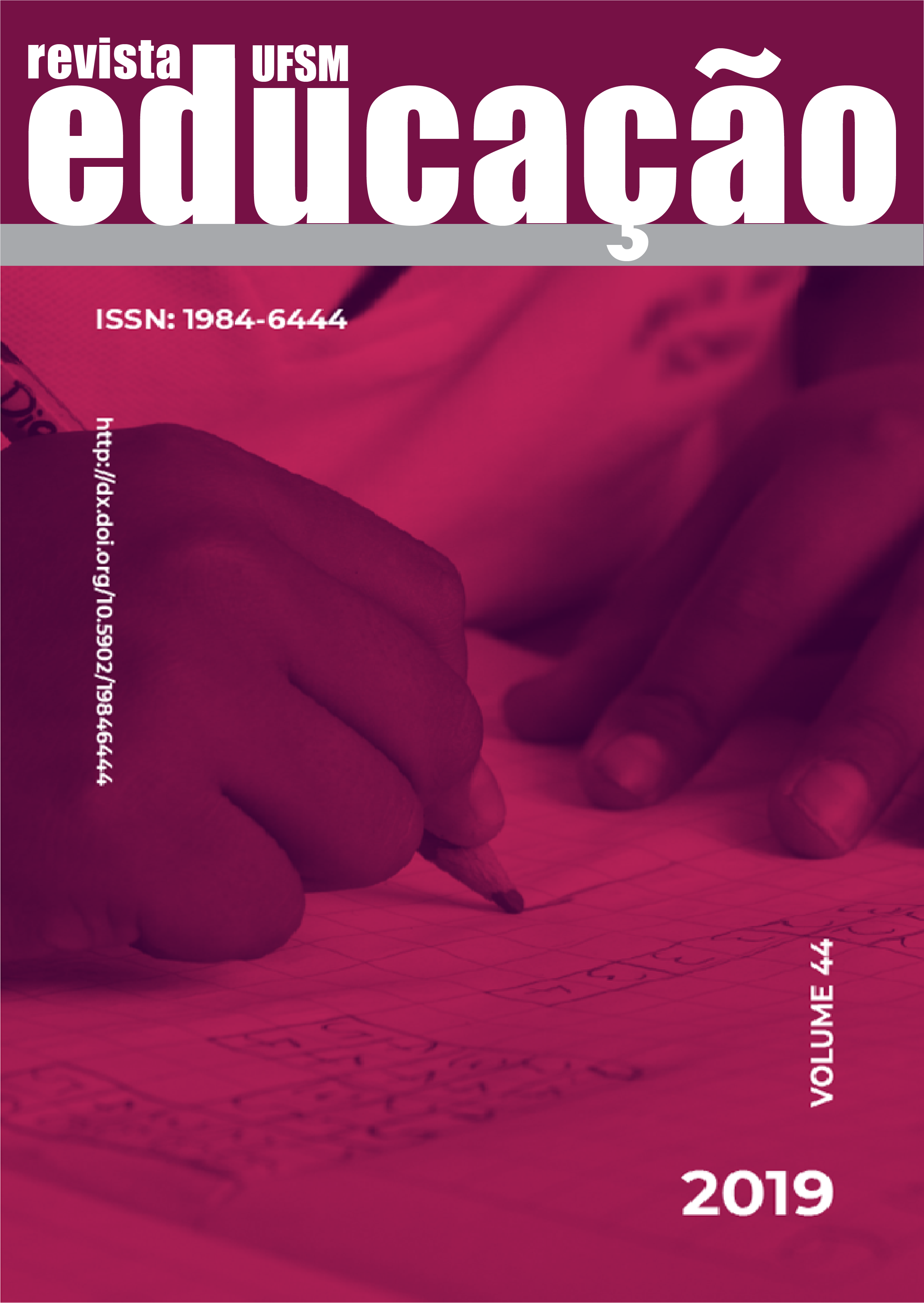Young People and Adult Education, Multigraded Teaching and Digital Learning Resources: an attempt dialogue
DOI:
https://doi.org/10.5902/1984644434990Keywords:
Young People and Adult Education, Multigraded teaching, Digital learning resources.Abstract
This paper aims to answer the following research question: "How can multigraded classes of the Youth and Adult Education, combined with the use of technologies, contribute to the teaching-learning process?”. To do so, it aims to investigate the contributions of multigrade classes and the use of digital didactic resources in the teaching-learning process of the student of the Young and People Education. Regulated by specific legislation, Young People and Adult Education has been widespread as an important means of inclusion in recent years. However, in some institutions it is allied to the reality of multigraded teaching, which involves students from different grades in the same classroom. Recent research, shows the challenges faced by teachers in working Young People and Adult classes. This research is qualitative and it was used a bibliographic research and semi-structured interview in a sample of 20 high school students of multigraded classes of the Youth and Adult Education modality of one branch of the SESI/RJ School. The conclusions pointed to a positive evaluation of the junction between EJA, multiseriate and digital didactic resources.
References
ANDRADE, Maria Margarida de. Introdução à Metodologia do Trabalho Científico: elaboração de trabalhos na graduação. 8. ed. São Paulo: Atlas, 2007.
BEHRENS, Marilda Aparecida. O paradigma emergente e a prática pedagógica. Curitiba: Champagnat, 1999.
BERRY, Chris. Multigrade Teaching: a discussion document. 2010. Disponível em http://www.ioe.ac.uk. Acesso em 12 de setembro de 2018.
BRASIL. Diretrizes e Bases da Educação Nacional. Lei nº 9.393/96. Diário Oficial da União, 20/12/1996.
CAMINHA, Ivanete Saskoski; OLIVEIRA, Adriana Leônidas de. Características da Educação de Jovens e Adultos na percepção de egressos matriculados no Ensino Superior. In: X Encontro Latino Americano de Pós Graduação. São José dos Campos-SP. Mostra Científica – UNIVAP – X Encontro Latino Americano de Pós Graduação, 2010.
CANDAU, Vera Maria. Construir ecossistemas educativos - reinventar a escola. In: CANDAU, Vera Maria (org.). Reinventar a escola. 5 Ed. Petrópolis: Vozes, 2007. p. 11-16.
FERRI, Cassia. Classes multisseriadas: que espaço escolar é esse? 1994. 166 f. Dissertação (Mestrado em Educação) – Centro de Ciências da Educação, Universidade Federal de Santa Catarina, Florianópolis, 1994.
FREIRE, Paulo. A importância do ato de ler. 45ª ed. São Paulo: Cortez, 2003.
INEP - INSTITUTO NACIONAL DE PESQUISAS EDUCACIONAIS ANÍSIO TEIXEIRA. Panorama da educação no campo. Brasília: INEP, 2007.
JESUS, Eliângela Ferreira de; MACHADO, Liliane Campos. Reflexões sobre a proposta curricular da Educação de Jovens e Adultos. In: III Congresso Norte-Mineiro de Pesquisa em Educação: Diferentes Linguagens na Formação do Professor. 2011, Montes Claros. Anais. Montes Claros: Unimonte, 2011. v. 1. p. 1-22.
LEMOS, Marlene Emília Pinheiro de. Proposta Curricular. In: BRASIL. Salto para o futuro: Educação de Jovens e Adultos. Brasília: Ministério da Educação. SEED, 1999. Vol. 10, p. 19-25, 112p.
OLIVEIRA, Rita de Cássia da Silva. EJA em Ponta Grossa: Características do Público Discente. Revista HISTEDBR Online. Campinas. n. 41, p. 255-269, mar. 2011.
ROSA, Ana Cristina Silva da. Classes multisseriadas: desafios e possibilidades. In: Educação & Linguagem. Ano 11, n. 18, p. 222-237, jul./dez. 2008.
SOUSA, Kesia Costa.; CUNHA, Nathan da Silva. Perfil dos alunos da Educação de Jovens e Adultos de Teresina. In: VI Encontro de Pesquisa em Educação da UFPI. 2010. VI Encontro de Pesquisa em Educação da UFPI, Teresina: UFPI, 2010.
Published
How to Cite
Issue
Section
License
Declaration of originality
We declare that all articles present in the journal Educação (UFSM) are originals and were not submitted for publishing on any other publication, as a whole or a fraction. We also declare that, after being published by Educação (UFSM), a paper will not be submitted to another journal within two years. After this time, our journal transfers the publishing rights to the authors, with a permit granted by the Editorial Council.
We also acknowledge that the originals’ submission to Educação (UFSM) implies on a transference of copyright for physical and digital publishing to the journal. In case of noncompliance, the violator will receive sanctions and penalties predicted by the Brazilian Copyright Protection Law (n. 9610, dated 19/02/98).
Attribution 4.0 International (CC BY 4.0)
This license lets others remix, transform, and build upon the material for any purpose, even commercially, and copy and redistribute the material in any medium or format.

This work is licensed under a Creative Commons Attribution 4.0 International (CC BY 4.0)






